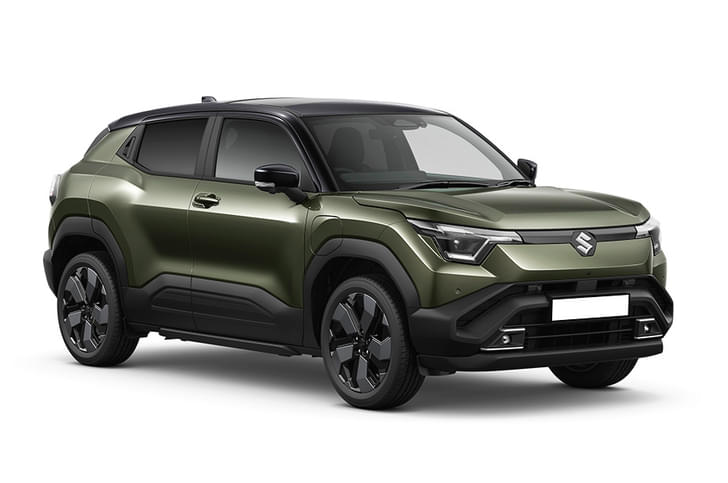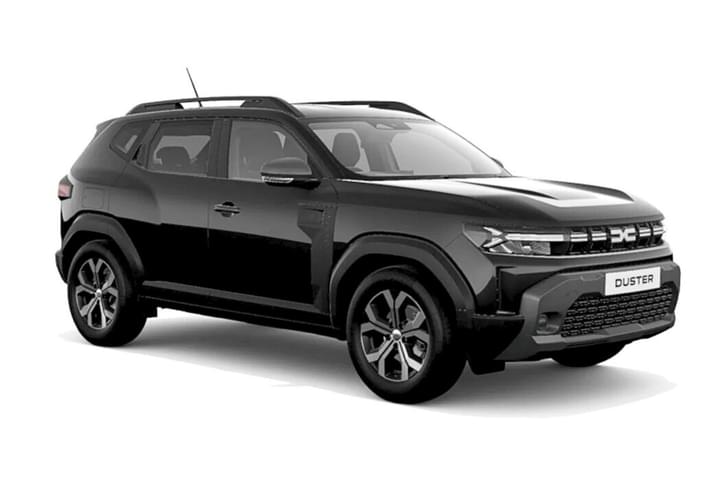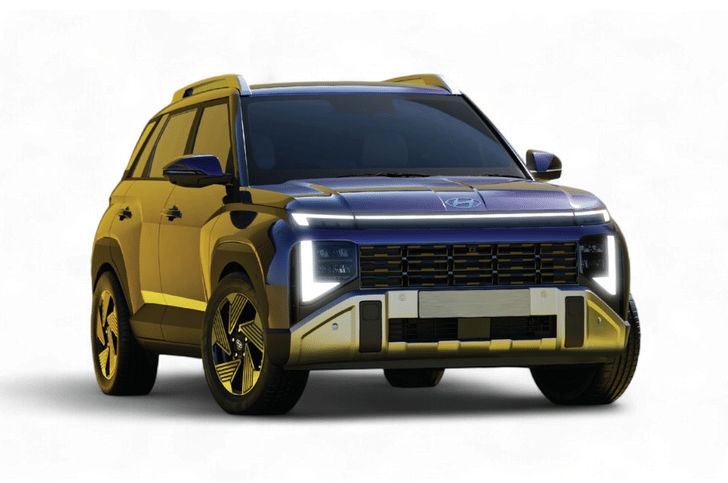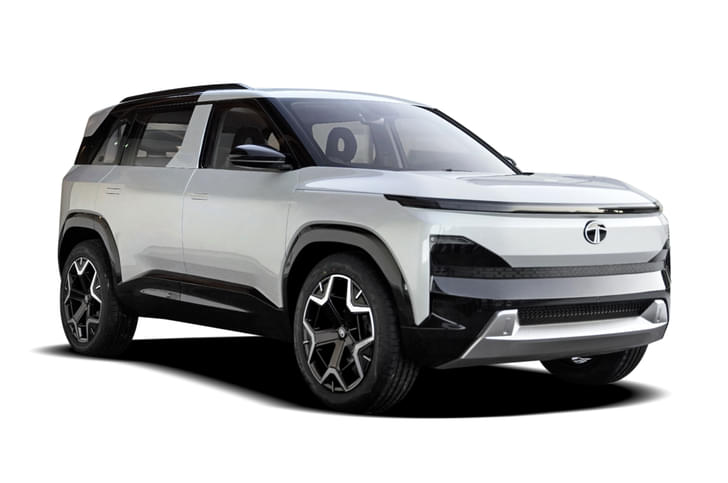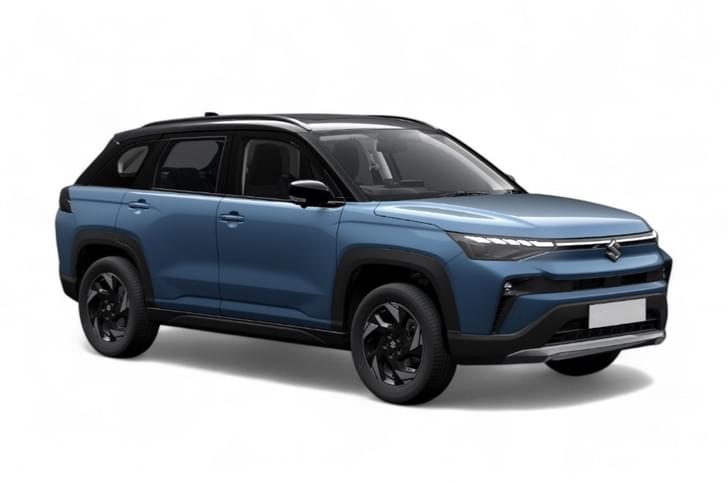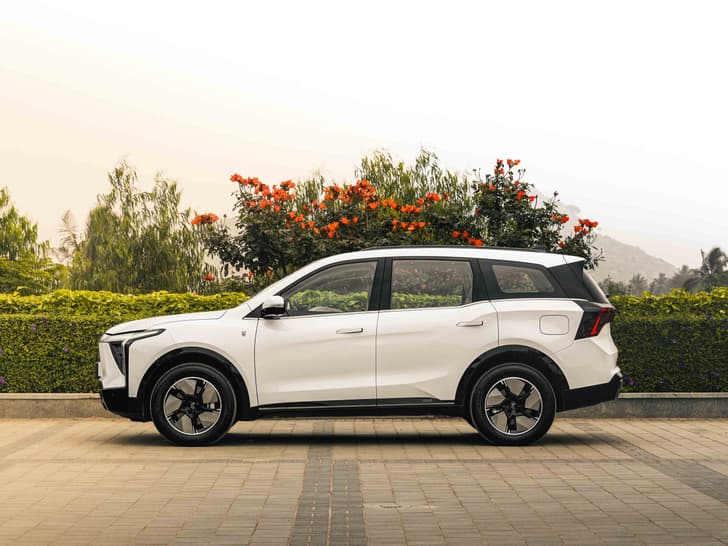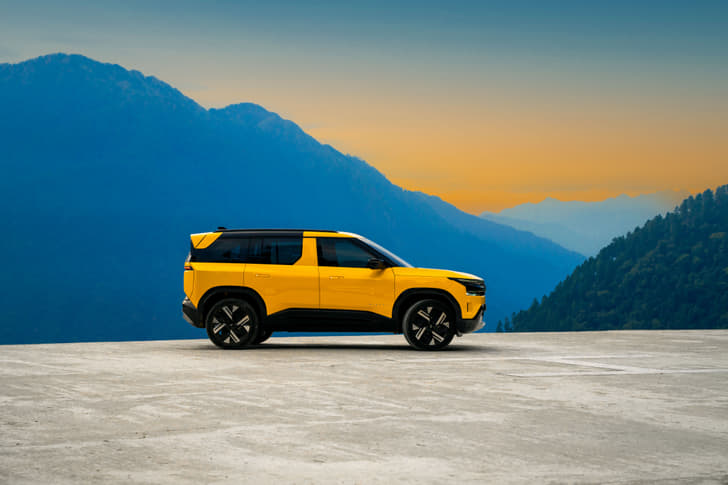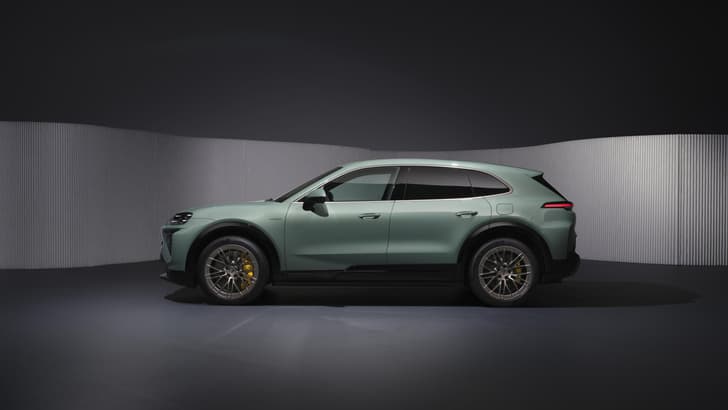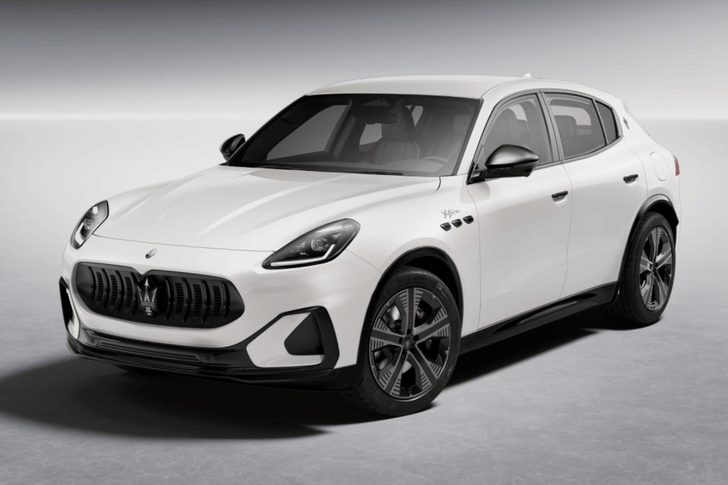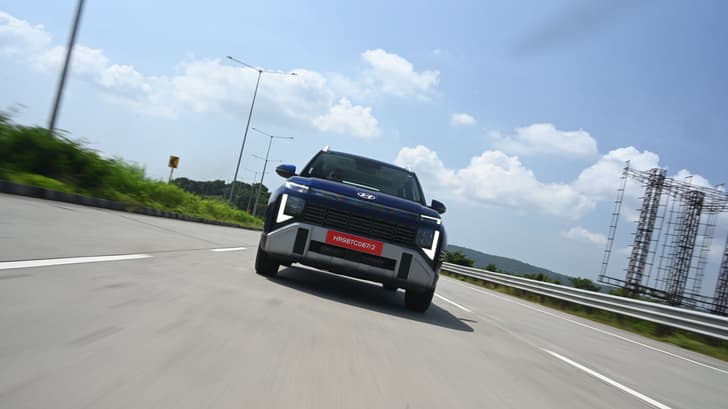Every year, around September, the good people that run the city of Mumbai allow the residents to enjoy a form of water sport unique to the island city. This doesn’t take place along the monsoon-ravaged coast. And the lakes that dot the city don’t play a major role either. This is more a Venetian-style fiesta, where the streets are filled with water, and popular gymkhana events include long-distance water wading, navigating the shallows, and the quick extraction of stranded vehicles. Pamplona has the bull run and Siena has the Palio di Siena, but they aren’t a patch on Mumbai’s street games.
DEEP DIVE
As luck would have it, I have almost the perfect ‘tool’ for the job; the all-new Discovery, a car the company calls its most versatile SUV yet. Not to be confused with the smaller Discovery Sport, this Range Rover-sized Land Rover sits at the top of the Discovery range and shares most of its bits with, you guessed it, the Range Rover and the Range Rover Sport. But why does Land Rover call it the versatile off-roader in the range? Simple; it blends seven-seat practicality, a rugged build, real off-road skills, and loads and loads of luxury into one modern-looking package.
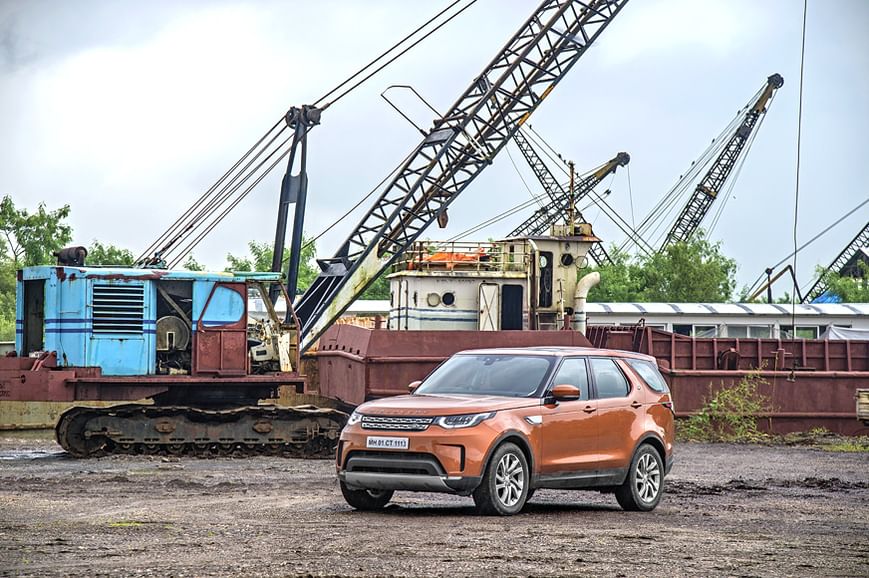
But it’s time to put the 900mm water-wading depth and its 283mm ground clearance to the test. It’s not like I have much of a choice; with water levels rising and the ‘island’ of dry ground around me fast receding, an early departure is a must. I watch and observe for a bit as car after car gets stuck. But the water level seems manageable for the Disco, so I lift the air suspension to its maximum rock-crawling height, gingerly dip the chin in the water and start moving. Once in the ‘stream,’ I keep a small bow wave going, as you should, and hold onto a constant throttle.
Then, I get the chills. The water gets deeper. Talk about being thrown in the deep end; I’ve only just gotten behind the wheel. Luckily, the Disco keep motoring, clears the deepest water and carries on, slaloming past all manner of stranded cars. With its chimney-type intakes placed high up in the bonnet, it feels so comfortable even at this water level. I manage to drop photographer Ashley off on a low wall and then circle around so he can get a few shots. Crazy.
STREET FIGHTER
Once out of the low-lying areas of Mumbai, I return the car to its regular ride height. Traffic is thin, there are only stray pools of water, and I want to see how well the Disco rides over our rain-damaged roads. This, after all, will be the environment it will frequent most often and it sure has the hardware to get the job done. This car’s chassis comes straight from the super-comfy Range Rover Sport, and that’s not it, the Disco also gets air springs as standard. So it’s no surprise that once you are above 50kph, it has the ability to flatten every bad patch you come across. The air suspension helps keep everything level and flat, the suspension works silently, and the impressive bit is that the Discovery almost never loses its composure, even as the ruts and holes and gutters get larger. This, to some extent, could be down to its weight and the massive ground force it exerts; but there’s still no denying the presence of some amount of magic here.
That said, however, there is a bit of stiffness at low speeds. You are aware of what kind of surface you are driving over when you are at a crawl. It isn’t limo-smooth at low speeds like a Range Rover is, and though it floats a bit, the Audi Q7’s low-speed ride is a bit better too.
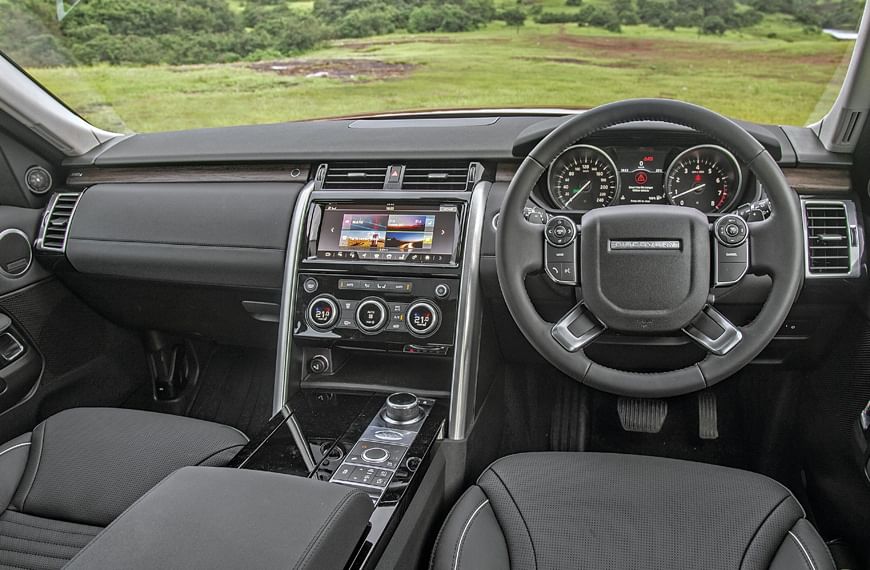
What undoubtedly works in favour of the Disco is the commanding view you get of the road. I can clearly see the wide shoulders on the Namib Orange bonnet, I can see way into the distance, over the tops of other cars, and, truth be told, this is ahuge advantage when you need to steer this supertanker through tight-fitting gaps. What makes the urban driving experience even nicer is that the 340hp supercharged petrol engine responds immediately and effortlessly when you tap the throttle, quite impressive. Such a refreshing change from the slow to respond, but spikey diesels we are used to in cars like these. And isn’t it nice that the engine revs all the way to 6,500rpm?
We’re now well on our way out of town, en route the highway. And as I spend more time behind the wheel, I can’t help but marvel at the steering. It’s an electric unit, but feels so good it could easily be confused for a hydraulic one. It’s a bit weightier than the setup on your regular German SUV and needs a bit more muscle to move rapidly, but it is so deliciously accurate and precise. The on-centre feel is so good, I get the impression every little dab is precisely calibrated. And that comparatively thin-rimmed, leather-lined wheel reminds me of being behind the wheel of a modern-day Rolls Royce. That laser-like accuracy, the lack of play, it’s all there.
ON FASTER ROADS
As the roads open out and lead to long uninterrupted stretches, I get a chance to experience the petrol engine in all its glory for the first time. And let me tell you, it’s some experience. Now normally supercharged engines respond well initially, but the harder you work them, the less impressive they get; the laws of diminishing returns working overtime. Not on this engine though. Borrowed from Jaguar and the F-Type sportscar, the AJ126 has tremendous punch in the mid-range and pulls hard and loud all the way to the 6,500rpm redline, the whine and scream from the supercharger raising the hairs on my forearm. I give the Disco a full workout and stretch it past 150kph a few times; this thing is just such a blast. And then, despite everything, a sense of disbelief sets in. Is this massive and bulky SUV really that quick? That snarling soundtrack is just outstanding, and then there’s the way it rockets forward – 0-100kph comes up in a quick 7.9sec, and with 150kph coming up in 15sec, it’s as fast to the latter as an Audi Q7 3.0 TDi; and that’s without all the additional torque of the diesel. Also, please remember, despite the bariatric surgery and the all-aluminum construction, the Disco still weighs in at a pavement-crumbling 2.2 tonnes.
After the long stretches of the Mumbai-Pune expressway come the long, fast corners of the ghat section. And that’s where I assume the Discovery will ‘fall apart’. It’s one of the tallest SUVs on sale, and has loads and loads of heavy four-wheel drive and low-range hardware. So, things don’t look too promising.
First impressions, however, are surprisingly positive. The Disco is quite neat and tidy in high-speed corners, and this is because, despite everything, it seems to do a good job of keeping its mass in check. That fabulous steering helps on the way in, and though it rolls, (of course it does) it settles nicely on its outside wheels, allowing you to carry a fair amount of speed out the other end. The grip from the fat tyres is good, the reasonably quick gearbox helps on the way into and out of corners, and once you work up a rhythm, you really can cover ground at a fair lick.
Where it does fall apart and feels sloppy and top-heavy is in tighter corners. Get to the tighter stuff and the switchbacks, and the sharp changes of direction do catch it out. And then I wish brakes were better. Stopping power is good and the brakes have a fair amount of bite as well, but the somewhat mushy pedal does need a bit more feel
and firmness.
BORN TO BE WILD
After around a couple of hours of driving, we land up at our destination: 19 Degrees North in Aamby Valley. A private off-road course, this is a place we’ve been using increasingly, as it provides a consistent yardstick for the more serious off-roaders we test. Unfortunately, some of the more difficult bits have turned to a mush pit due to the heavy downpour. We still do a few runs in and around the regular course, but the Disco barely breaks into a sweat. Despite traction being poor and the four-wheel drive being in ‘high’, the SUV just walks it. Guess we’ll have to come back another time to give it a proper workout. Suspension raised, it even nonchalantly dispatches a slimy rocky climb. One thing’s for sure: there’s some serious capability here.
OUTSIDE AND IN
Where it also scores heavily over the earlier car is in the looks department. Whereas the earlier version, the Discovery 4 was full of cubes, right angles and flat panels, the Discovery 5 is much more a modern SUV that looks very Range Rover-like. The integrated headlights, angular surfaces and muscular skinning make it fit right into the family. And then there are a few new bits that really make it stand out, such as the brilliantly executed vertical vents in the front bumper, that flash of chrome on the flanks and the snug-fitting muscular wheel arches. Land Rover designers have included some details like the angular and thick C-pillar, and the stepped roof to maintain the identity of the Disco. While these work well, the offset number plate at the rear and that massive overhang make the Disco look a bit ungainly.
The interior, however, is a happy mix of a full-on luxury car, and a rugged and serious off-roader.
Stuff you touch and feel inside the cabin is beautifully executed, with many of the systems carried over from the Range Rover and Range Rover Sport; there’s loads of luxury and comfort here. The steering wheel feels special and the pop-out gear lever, high-quality leather
seats and the wide touchscreen add to the feel-good factor. But that feeling of overt opulence – with double-stitched leather and suede covering every surface as on a Range Rover – is just missing.
And look closely. There are even are a few low-rent plastics here, the likes of which just don’t belong on a car of this price. Stuff like the Discovery Sport-like dials and the vents on the centre console look too simple, and the touchscreen, though nice and large, misses out on Apple CarPlay and Android Auto.
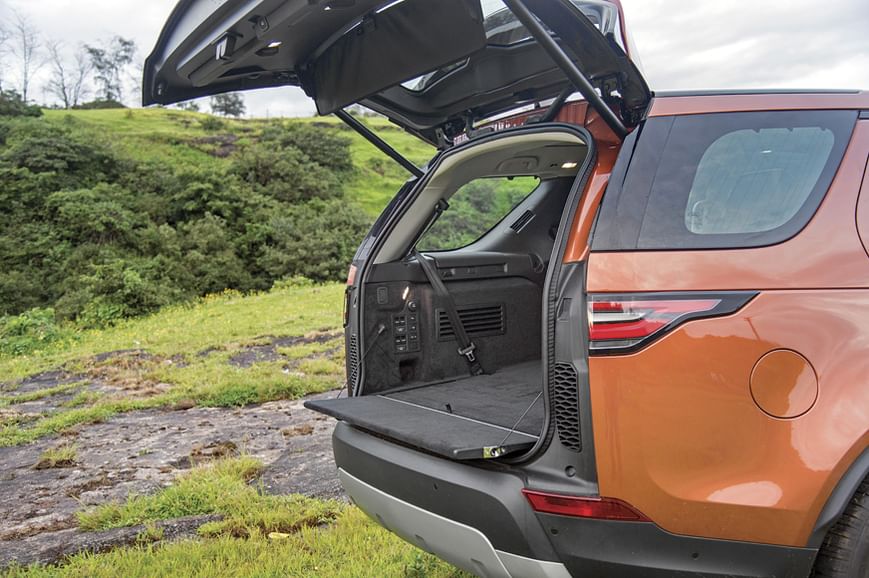
What you do get, however, is a robustness and everyday practicality that attempt to deliver the best of both worlds. The cabin, for one, is immensely practical. You get two gloveboxes, massive door pockets and a deep storage box behind the gear selector in the central console. You can gain access to the big storage area under the cupholders by sliding them back. Also, lift up the elbow box, and you’ll find the mini fridge or coolbox. Even cooler is the fact that you can store valuables behind the air con controls; a velvet-lined storage area opening up behind.
The front seats are simply fabulous. Large and supportive, with plenty of head, shoulder and legroom, it keeps those seated here comfortable. The base is wide, the wide backrest is very supportive, and what’s nice is that the seats are both cooled and heated. And this is true of the seats on the second row as well. You are, however, sat a bit too low and visibility forward is poor due to the large headrests that incorporate screens. The third row is very usable though. Access is easy and once in the seat, comfort is actually quite good. Space is decent, the backrest is nicely inclined and passengers in the rear even get their own set of vents, above their heads. What enhances the driving experience, however, is the Meridian sound system. It offers an impeccably tuned and uncoloured ‘British sound’, strong amplification and speakers that offer a very high level of clarity.
The powered second and third-row seats are the Discovery’s best party trick. The controls for these are liberally scattered all around the cabin. There are some on the second-row seat tops, others on the rear wheel arch, and there’s even a master control in the rear. These switches allow you to fold both the rows forward and flat, and the control ‘panel’ at the rear even allows you to tip the car forward or back to aid loading of luggage.
A NEW PATH
The new Discovery is practical, enjoyable to drive, seats seven comfortably and is very capable off-road. The towering seating position gives you a sense of confidence and utter control; something we discovered first-hand in the recent deluge in Mumbai. If fact, it is such a good all-rounder, there’s practically nothing it doesn’t do well. If we were to pick holes we would have liked a plusher cabin, the second row of seats could do with more thigh support and for some, the styling at the rear is probably on the wrong side of quirky. The elephant in the room, however, is the petrol motor’s heavy fuel consumption. Yes, the Rs 15 lakh price gap to an equivalent diesel does soften the blow, and there are myriad benefits to driving a petrol car; things such as smoothness, a wide powerband and keen throttle response. But when we drove the car hard, it gave us no more than 5kpl and whichever way you look at it, that’s a lot of fuel guzzled; precisely why the diesel version will continue to be popular with prudent Indian car buyers. But, if you can get your head (and wallet) around the high fuel bills, you will be rewarded with a snarling, happy-to-rev, fast, supercharged Jaguar-based petrol that’s a genuine delight to drive.
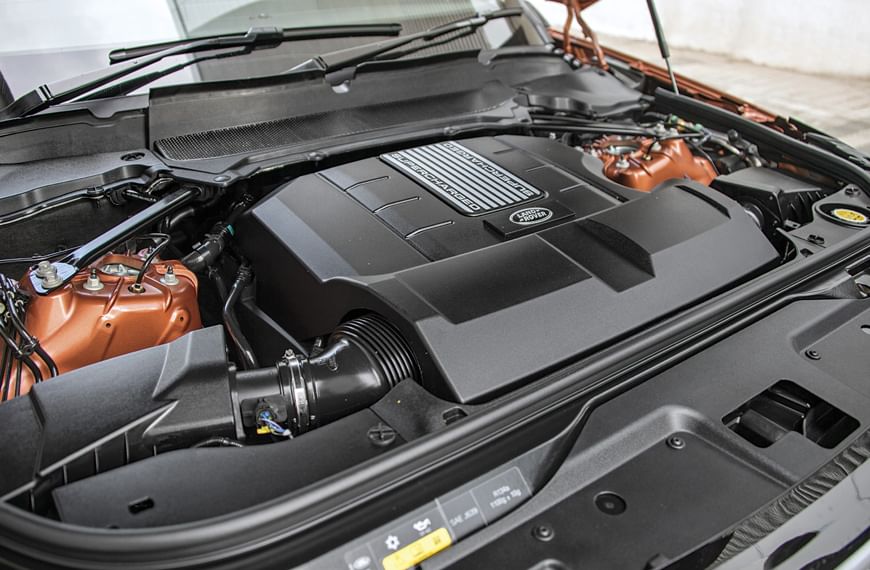
DISCO-TECH
The new Discovery 5 is built on the Range Rover Sport’s all-aluminium monocoque. The adjustable air suspension features double wishbones at the front and a multi-link layout that retains LR’s characteristic integral link at the rear. Both front and rear suspension are mounted on steel subframes designed to withstand knocks and bangs that are fairly common during off-roading. And since this is a serious off-roader, it also gets a full-sized spare wheel. If you so desire, you can equip the car with 22-inch wheels.






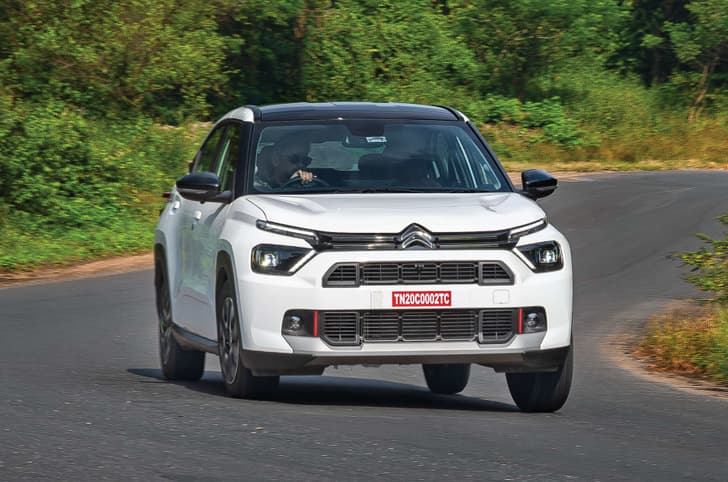
.jpg?w=728&q=75)
.jpg?w=728&q=75)
.jpg?w=728&q=75)
.jpg?w=728&q=75)
















